A D M I N I S T R A T O R
SCHOOL LEADERS MUST LEAD LITERACY EFFORTS IN SCHOOLS

Dr. Hernandez examines the role administrators play in the literacy journey of their students.
Executive Viewpoint Page 3
THE IMPORTANCE OF SUPPORTING OUR NEW EDUCATORS
Dr. Neathery highlights some ways administrators can offer support to new educators.
President’s Perspective Page 4
ADMINISTRATOR SPOTLIGHT: JASON BRUNNER
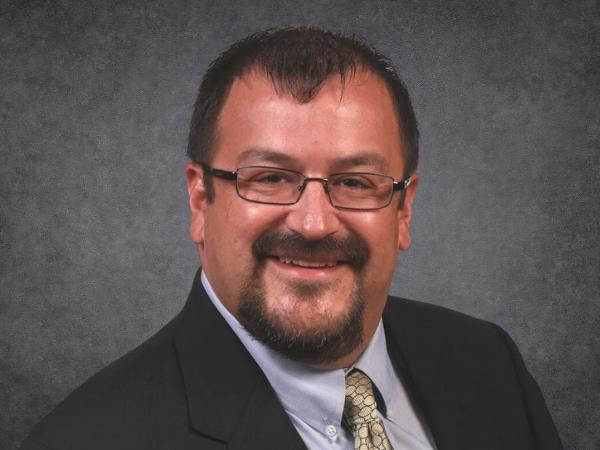
In the Spotlight this month is Jason Brunner, Assistant Principal at Old High Middle School in the Bentonville School District.
Page 7
TABLE
T H E
OF CONTENTS Executive Viewpoint • P. 3 CoSN Update • P. 4 President’s Perspective • P. 5 Asked & Answered • P. 6 Benefits Corner • P. 6 Administrator Spotlight • P. 7 Upcoming Events • P. 9 AAEA: On a Role! • P. 10 Compliance Connection • P. 11 Over the Top • P. 11 Publication Sneak Peek • P. 12 Job Openings • P. 13
VOLUME 49 • ISSUE 3 SEPTEMBER 2023
AAEA Staff
Dr. Mike Hernandez Executive Director m.hernandez@theaaea.org
2023 Calendar of Events
September
New GT Coordinators Workshop, September 14, 2023
Solution Tree Offices, Little Rock
Mike Mertens Assistant Executive Director m.mertens@theaaea.org
Lenett Thrasher Director of Learning Services & Operations l.thrasher@theaaea.org
Sharon Chuculate Fiscal Services Coordinator s.chuculate@theaaea.org
AAFC Fall Conference, September 20-22, 2023
Hot Springs Convention Center
ArkASPA Fall Conference, September 26, 2023
Wyndham Riverfront, North Little Rock
October
ASPMA Conference, October 2-4, 2023
Hot Springs Convention Center
Sarah Shamburger Business Manager s.shamburger@theaaea.org
Alyse Mattox Communications & Technology Specialist a.mattox@theaaea.org
Melanie Thrasher Business Analyst m.thrasher@theaaea.org
AAGEA Conference, October 4-5, 2023
Benton Event Center
AAEA Fall Conference, October 10, 2023
Benton Event Center
CASBO Certification Classes, October 24-25, 2023
Four Points by Sheraton, Little Rock
November
Lana Webb Administrative Specialist l.webb@theaaea.org
AACTEA Conference, November 9, 2023
Delta Marriott, Little Rock
Rachel Blocker Administrative Assistant r.blocker@theaaea.org
For more information, visit theaaea.org/events or see Page 9.
1
2023-2024 AAEA Board of Directors
Dr. Karla Neathery AAEA President Superintendent, Sheridan
Dr. Andrea Martin AASA President Superintendent, Greenland
Steven Helmick
AAESP President-Elect Principal, Little Rock
Matt Ziegler AASSP Past President Principal, Riverside
Kelsey Bailey AASBO President Chief Financial Officer, Little Rock
Valerie King AAGEA President Director of Gifted Programs, Siloam Springs
Stacy DeFoor AAEA President-Elect Assistant Superintendent, Benton
Kelvin Gragg AASA President-Elect AssistantPineSuperintendent, Bluff
Carol Skiba AAESP Past President Principal, Cabot
Rebecca Rosburg ArkASPA President Assistant Superintendent for HR/Federal Programs, Hot Springs
Melody Crane AASBO Past President Business Manager/District Treasurer, Hector
Jason Brunner AAMLA President Assistant Principal, Bentonville
Jarod Morrison Tel-AR President Director of Maintenance/ Technology, Farmington
Charles Warren AAEA Board Secretary Chief Financial Officer, Fort Smith
Dr. Debbie Bruick-Jones AASA Secretary Superintendent, Bentonville
Amy Marek AASSP President Principal, Hazen
Lisa AACTEAHotsenpiller President Director of Career & Technical Education, Fayetteville
Natalie Gosdin AASEA President Director of Special Education, Searcy
Craig Dupuy ASPMA President (until Oct) Assistant Superintendent, Benton
Dr. Mike Hernandez AAEA Executive Director
Prestigious
Brian Kirkendoll AAEA Past President Principal, Alma
Shawn Rose
AAESP President Principal, Hillcrest
Dr. Jason Reeves AASSP President-Elect Assistant Principal, Alma
Dr. Dana Brown AAFC President Assistant Superintendent of Administrative Services, Mountain Home
Ellen Phipps AACIA President Curriculum Director, Ouachita
Greg Collins ASPMA President (begin Oct) Maintenance/Facilities Supervisor, Dover
2023 AAEA Corporate Sponsors
American Fidelity Assurance Co.
Cognia
Coryell Roofing and Construction, Inc.
Curriculum Associates
Educational Benefits, Inc.
GoSchoolBox
Lifetouch National School Studios, Inc.
NIET - National Institute for
Excellence in Teaching Performance Services
Pro Benefits Group, Inc.
Renaissance Learning, Inc.
School Responder
Solution Tree, Inc.
Distinguished Apptegy
Capturing Kids’ Hearts
Lexia Learning
Pearson Virtual Schools
Diamond Allovue
Arkansas Public Safety Solutions
Baldwin & Shell
ClassWallet
Diamond (Continued)
Defined Learning
Edmentum
Education Elements Energy Systems Group
ESS
First Security Beardsley
Imagine Learning
Just Right Reader
Middleton, Inc.
OnToCollege
SmartData Dashboard
Stephens, Inc.
Tanium
White River Services and Solutions
Winsor Learning
Platinum AAMSCO
Architecture Plus, Inc.
C.R. Crawford Construction, LLC
Cromwell Architects Engineers
DotCom Therapy, Inc.
Entegrity Energy Partners, LLC
Legacy Construction Management
Nabholz Construction Corp.
Platinum (Continued)
Northwest Evaluation Association (NWEA)
Polk Stanley Wilcox Architects
Progressive Technologies
TRANE US, Inc.
Gold
CDI Contractors
Cynergy Rehab Group
Goalbook
Houghton Mifflin Harcourt
IXL Learning
Kinco Constructors, LLC
Phoenix Contractors, LLC
Red Comet
TIPS - The Interlocal Purchasing System
Zaner-Bloser
Silver Adleta
American Bus Sales, Inc.
Correll, Inc.
French Architects, PA
Hight-Jackson Associates, PA
SEAS
2
Dr. Mike Hernandez, AAEA Executive Director

SCHOOL LEADERS MUST LEAD LITERACY EFFORTS IN SCHOOLS
Learning to read is the fundamental skill one must know to attain a quality education. Reading allows individuals to communicate effectively, comprehend complex concepts, and participate fully in our world. Foundational literacy skills contribute to academic success and empower students to be a part of an increasingly information-driven world. So, what role do school leaders play in this literacy journey for students? School leaders, including principals, administrators, and instructional coordinators, are the lynchpin of providing opportunities for their staff to be organized and efficient in supporting their students to reach literacy goals each year.
School leaders often recognize that learning to read is not confined to English class alone. It should be a part of all subjects and aspects of learning. Students should practice their literacy skills in science, mathematics, and history. I once had a teacher who always assigned the word problems for homework. This was for Algebra 1, Algebra II, Geometry, Trigonometry, and Calculus. He never got much appreciation then, but now he should be commended for simultaneously challenging us to read and learn technical reading skills. This should be the same in every classroom across our state. School leaders should establish a clear vision for literacy education that emphasizes its importance across the curriculum. Setting high expectations for teachers and students alone may not create a literacy culture. Leaders must follow up and inspect what they are expecting for it to become part of everyday life at school.
Continuous professional development of teaching staff is non-negotiable. There was a war in this state several years ago regarding the science of reading. This war is over, and the science of reading is the victor. We can lament about having to change from past practices, but it seems clear that administrators and teachers are ready to move forward and be successful in teaching reading and helping students succeed. The time is now to double down on instructional strategies and best practices concerning literacy. We must constantly monitor the current research and seek quality workshops, training, and conferences that bolster these efforts. Leaders should also be seeking ways to grow their knowledge and be able to "talk the talk" and "walk the walk." How do I know if my teachers are teaching the science of reading? What do I do for students who need to catch up? A questioning nature and finding answers will foster a learning community among leaders and teachers through exchanging ideas and ensuring that best practices are implemented with fidelity.
Reviewing of data and allocation of resources are two arts that leaders must master to keep the literacy train moving in a school and district. Regular assessment of reading and writing provides valuable insights into the progress of students' literacy skills. School leaders and teachers must be able to analyze this data and identify areas of improvement. This important work will allow teachers to tailor instructional approaches to address specific needs. If you find yourself not analyzing data for reading achievement throughout the year, start immediately. Learn about your assessment instruments and what information can be gleaned. Talk to teachers and ask what they do with this information. Sit in a data meeting and ask questions. Find the barriers and eliminate them. This will lead you right into being able to decide on how to allocate resources effectively. Adequate funding for literacy materials, such as books, digital
3 Executive Viewpoint
resources, and educational technologies, is essential to creating a rich and varied literacy environment. You must also be able to allocate the human capital in the best way possible. What does your data say about how you place new teachers? What support do you give them in teaching reading? Are your best reading teachers in the early grades? Leaders should also ensure that classrooms have varied reading materials and quality teachers and support, particularly for students with learning disabilities and ELL students.
Reading is a total team effort. No one can sit on the sideline and watch the other players and expect literacy to change in Arkansas. Even though I have completed the awareness training for the science of reading, I am starting the LETRS for Administrators training to ensure I can help in any way I can and procure the best training for our leaders across the state. School leadership is pivotal in advancing literacy education within our state. We must set a clear vision for literacy instruction, provide professional development opportunities, allocate resources wisely, base decisions on data, promote collaboration, and support struggling students. Our state leadership and elected officials demand that we do whatever it takes and have laid a policy foundation to help us succeed. We can and we will do this!
One step in this direction is our AAEA Fall Conference at the Benton Event Center on October 10, 2023. We have a great agenda that will include stories from Mississippi, schools in Arkansas, and an exclusive screening of the early literacy documentary titled The Right to Read. Please join us for the conference. You can register here. September is here, and we are looking forward to supporting you!
CoSN: Support for Technology Administrators
CoSN is a great resource for school technology administrators. Check this page monthly for links to articles to assist technology leaders as they navigate through digital learning transformations.

4
Click Here to Read About This Month’s Topics White House Cybersecurity Summit for K-12 Schools
Innovation:
K-12
Newsletter
EmpowerED Superintendents
Roadmap to
CoSN Driving
Innovation
CoSN/AASA
edLeader Panel Series: Season 6 Premier CoSN Membership
President’s Perspective
Dr. Karla Neathery, AAEA Board President

THE IMPORTANCE OF SUPPORTING OUR NEW EDUCATORS
Teachers are one of the most precious assets in our schools. Administrators know that hiring and retaining the best of the best is of the utmost importance. We need these fresh-minded educators to bring their expertise whether it is an infusion of technology or a simple boost of excitement and energy. What actions can principals take to increase the likelihood of new teacher success? What can administrators do to retain these educators? How can we support teacher growth?
High Visibility and Recognition
New teachers want administrators in their rooms immediately because they want to have a positive impact on young lives. If we are in a new teacher's classroom on the first day or two of the school year and consistently after that, it will be much easier to build trust with them and provide ongoing guidance and support. Let's make sure our new teachers are off to a great start!
Be seen by all, and know everyone's names. Supportive administrators are visible throughout the school day. They casually swing by classrooms to check in on students and teachers, walk the hallways, and often engage with students during breaks. When they see faculty and staff, they greet them by name. When there is an issue, teachers have a good understanding of the administrator and often presume positive intentions. Being visible also goes a long way in building a sense of belonging.
Intentionally Assign Mentors
It is very common for districts/schools to assign mentors to new teachers. When a principal assigns a mentor, they are telling the new teacher that this is who we want you to be like. If these mentors are well-skilled, they can provide a solid foundation for the new staff member that can be very beneficial.
Once a mentor is chosen, the administration needs to provide support by making sure the pair has a regularly scheduled time to meet and interact. The principal will want the new teacher learning and borrowing ideas and practices from their assigned colleague. The right mentor can be a blessing to a teacher and serve as a guide and role model.
Assists with Classroom Management
It is essential to understand that all teachers in a school are managing their classroom the best way they know how. We must ensure our new staff members have the skill sets they need to hone their classroom management skills when there is no one around to help. We must make sure their toolboxes are full, and that they are effectively engaging students so that misbehavior is minimized.
New teachers can single-handedly alter the culture of our districts. Principals must protect them, support them, and give them confidence to succeed. By assigning them effective mentors, providing tools to manage a classroom, and supporting their self-care, administrators can help new teachers start their career on the right track.
5
Asked & Answered
Mike Mertens, AAEA Assistant Executive Director

A recent call was from a building administrator wanting clarification on Act 426 of 2023, the new law regarding foreign exchange students. Act 426 requires schools to take exchange students, no fewer than one per 50 enrollment. For example, a high school with 400 students would be required to take no less than 8 exchange students. The school can accept more than this number if it so chooses.
In addition, Act 426 allows schools, again, if it so chooses, to (1) require the placement organization to be certified by the Council on Standards for International Travel, (2) require documented proof of a student's English proficiency, and (3) require three-week notification of intent to enroll before the start of an academic semester. Also, the school has the option to include exchange student test results on statemandated tests.
For districts that subscribe to the ASBA model policy service, that is a model policy (4.2) that has updated language due to the passage of Act 426.
If you have questions for Mike, email him at m.mertens@theaaea.org .
National Suicide Awareness Benefits Corner
Submitted by Emily Cole, Marketing Coordinator, Educational Benefits

As we gear up for another school year, let's take a moment to address a crucial topic that needs our attention: September is World Suicide Prevention Awareness Month. Going back to school can be an exciting time, but it can also bring a lot of stress and anxiety for many students. It's essential to create a supportive environment where everyone feels safe and heard.
One of the most vulnerable groups facing suicide are adolescents. Annually, 11% of young adults aged 18-25 and 9% of high school students seriously consider suicide. Youth that identify as LGBTQ+ are 4X more likely to attempt suicide than straight youth.
To help those struggling with suicidal thoughts, it is important to know the warning signs. Some of these include:
• Social withdrawal
• Extreme mood swings
• Changes in sleeping patterns
• Changes in eating patterns
• Engaging in risky behaviors
• Using drugs or alcohol more often
• Talking about topics like guilt and shame, wanting to die, or being a burden to others
National Suicide Prevention Contacts
It is important to note that the number for the National Suicide Prevention Lifeline changed in 2022. Call or text 988 to get in touch.
Let's stand together and break the stigma surrounding mental health. Encourage open conversations, check in on your students, and offer a lending hand to those who may be struggling. Remember, your support could make all the difference. Together, we can make a difference in our school communities and beyond.
6
Administrator Spotlight: Jason Brunner



Assistant Principal, Old High Middle School, Bentonville Schools
Jason Brunner, Assistant Principal at Old High Middle School, says education was never in his mind as a child. However, various experiences in college introduced him to the idea of education as a career path. "Once I got my foot in the door, I couldn’t get enough!" he exclaims. "Now I can’t think of anything better than a career of serving the young people, families, staff, and community I get to serve."

After spending a couple of years in Springdale, he joined the Bentonville School District teaching various social studies classes at Washington Junior High for five years. He next spent a year at Bentonville High School before taking on the role of assistant principal at Old High Middle School, where he's remained for 17 years.
Mr. Brunner says his favorite thing about his job is easily the people. "Working with kids gives me energy. Partnering with our parents to help their children is an honor. Working with teachers that have the best mindset for kids is a privilege!" he says. The most challenging part of his job is that so much is thrown at educators, and balancing responsibilities can be difficult at times. However, he emphasizes that "it is ALL important for kids!" One thing he enjoys that others might find surprising is the TESS process with teachers. He says, "TESS allows an instructional leader the opportunity to continue to build the relationship between evaluator and teacher. TESS forces administration to put all of the managerial tasks to the side and focus on the instructional leadership portion of the job. TESS allows administrators to assist teachers to become the absolute best teachers they can be. Once again, this is all a WIN for the kids."
He suggests that anyone considering the career should "Keep your eye on the 'why.' Know and understand why you are doing this on a day-to-day basis. The work can be hard, but if you know the 'why' then it makes it ALL worth it." The most helpful advice he has received is "Don’t start the process of problem solving by thinking in absolutes. An absolute can close the door on an issue too quickly and do irreparable damage to the situation. Ask questions. Listen. Learn. Process. THEN make the decision and stick with it." As for his future plans, he sees himself closing out his career in education in the next few years, stating "It is not too far away for me. I hope to start the next chapter in my life, getting to travel with my wife, and EVENTUALLY spend time with grandchildren."
7
with Jason Brunner ? ! Q&A
How would your co-workers describe you?
Jason is the best kind of Old High superfan. comes in the form of cheerleading our teachers, pumping up our school to anyone who will listen, and defends even the toughest students by shouting their strengths! He's the guy you can count on to see the best version of yourself and it inspires people to actually BE that version.
What’s something that amazes you?
I am amazed at our children's continued ability to adapt. No matter what is thrown at them.
What have you done that you are most proud of?
I helped raise two very good young men.
What do you enjoy doing during your time off?
Spend time with my family, cheer on anything Hogs and Kansas City Chiefs, travel, read, and binge on TV shows

What is one of the things on your “Bucket List"?
Following the final grouping at the Masters golf tournament on a Sunday afternoon at Augusta National in April
If you weren’t in your current position, what would you be doing? This is hard for me to even imagine. However, I would like to think it had something to do with traveling.
What are the goals you are still working toward?
I want to be the best version of me. I know that God has given me so many gifts. I just want to use all those blessings to be the best I can.
When people look back at your life, how do you want to be remembered?
A believer, a good father for my sons, a good husband to my wife, a good family member, a good friend, and as a constant advocate for young people

What do you see as the biggest benefit of AAEA membership?
Networking. I have met so many people through AAEA. I have learned so much. However, even better….I have made many good friends throughout my time involved with AAEA.
8
GT Coordinators!
Federal Coordinators!
The 2023 New GT Coordinators Workshop will be held on September 14, 2023, from 10am to 2pm at the Solution Tree Offices in Little Rock. Those interested in attending can contact Dr. Mike Hernandez at m.hernandez@theaaea.org or by calling our office at 501-372-1691.
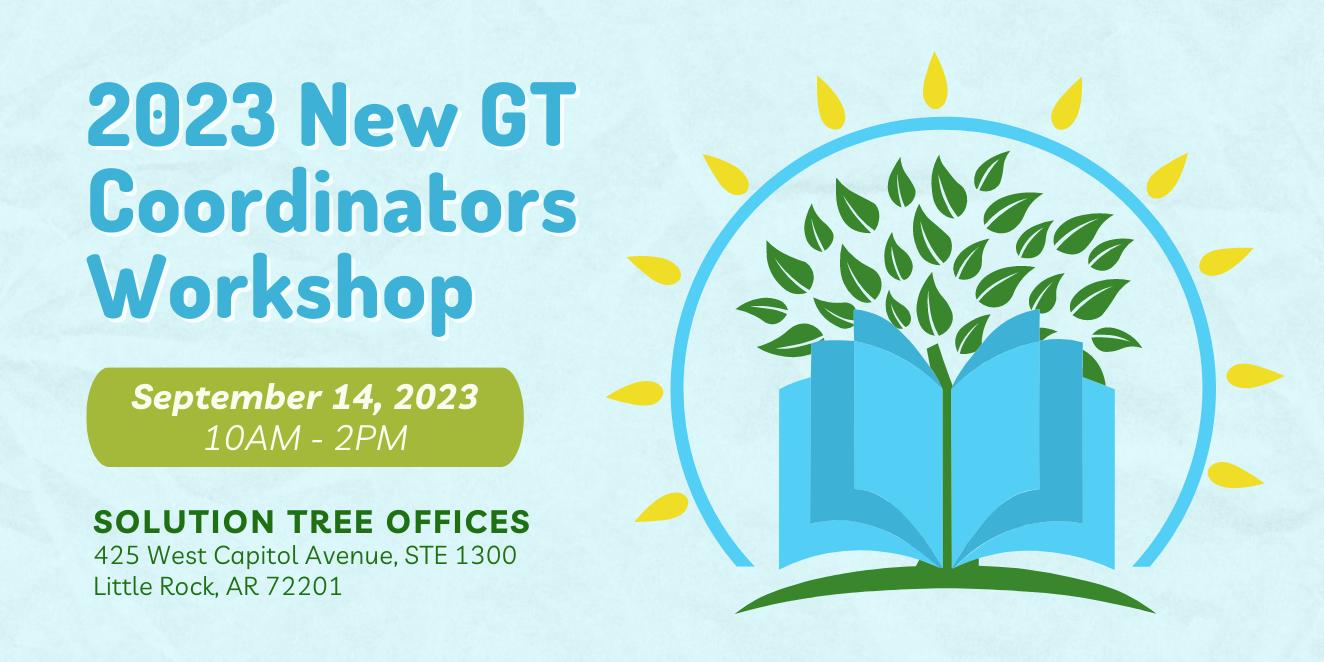
Personnel Administrators!
Registration is now open for the 2023 AAFC Conference to be held on September 20-22, 2023, at the Hot Springs Convention Center.
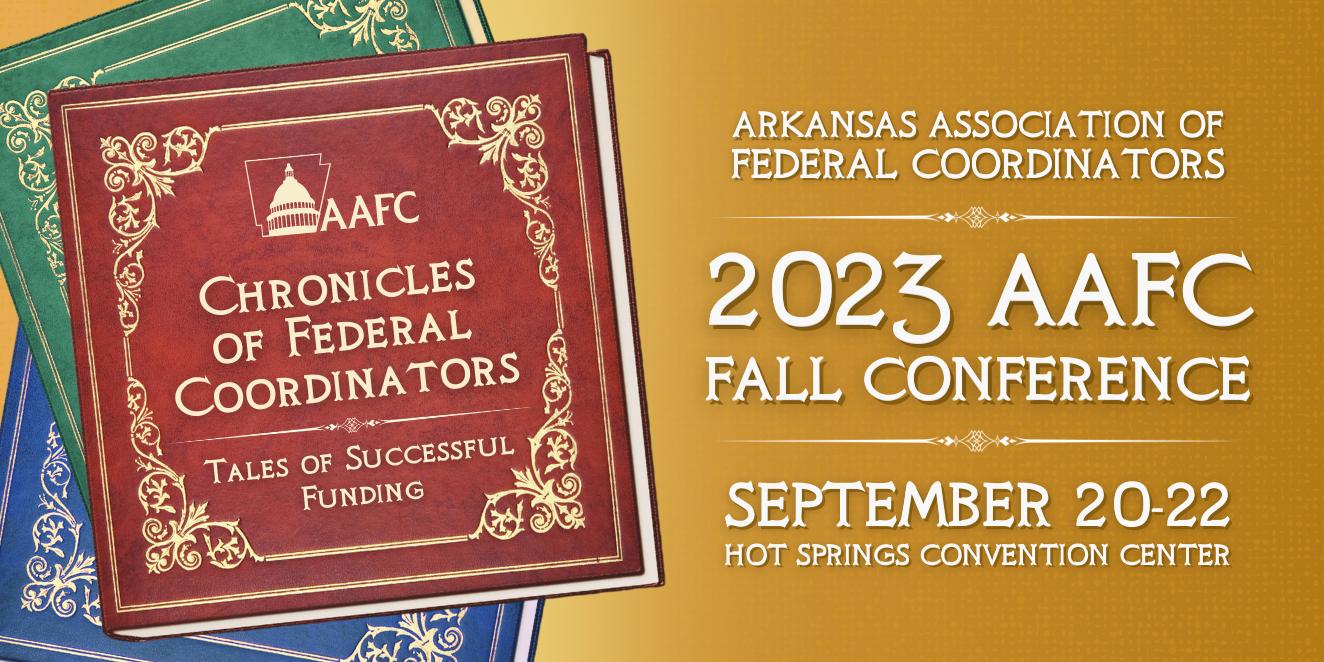
Plant Managers!
Registration is now open for the 2023 ArkASPA Conference to be held on September 26, 2023, at the Wyndham Riverfront Hotel in North Little Rock.
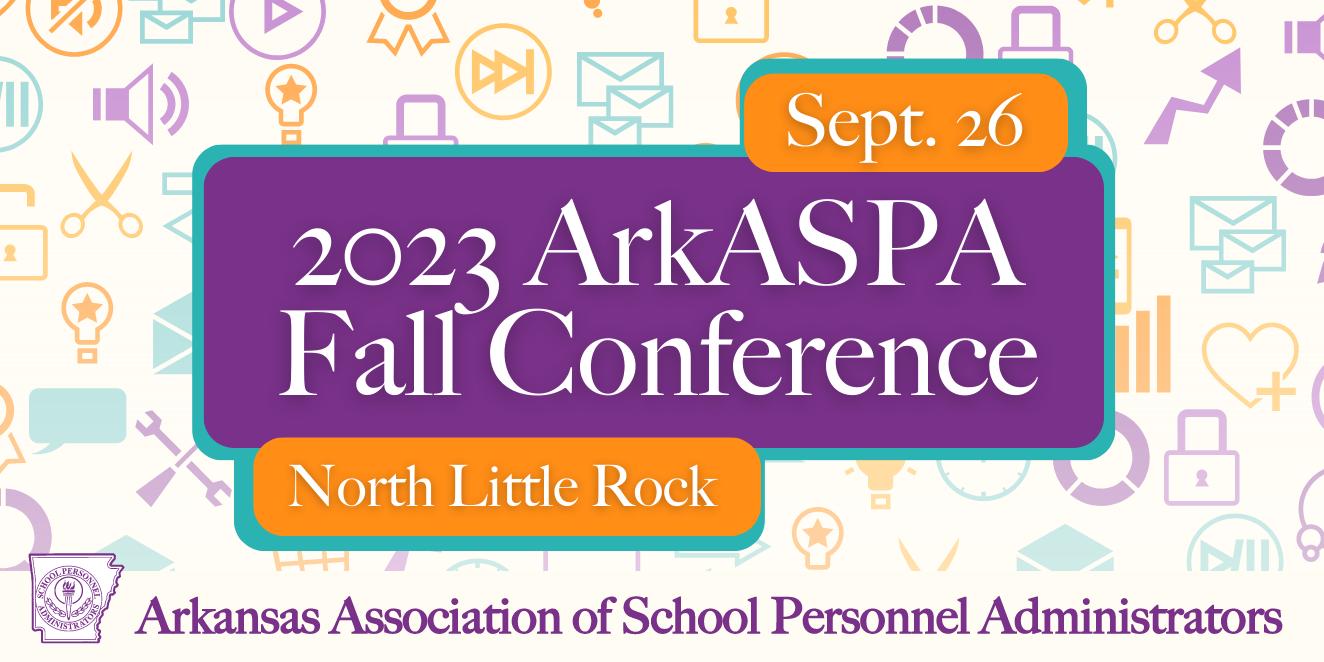
Registration is now open for the 2023 ASPMA Conference to be held on October 2-4, 2023, at the Hot Springs Convention Center.
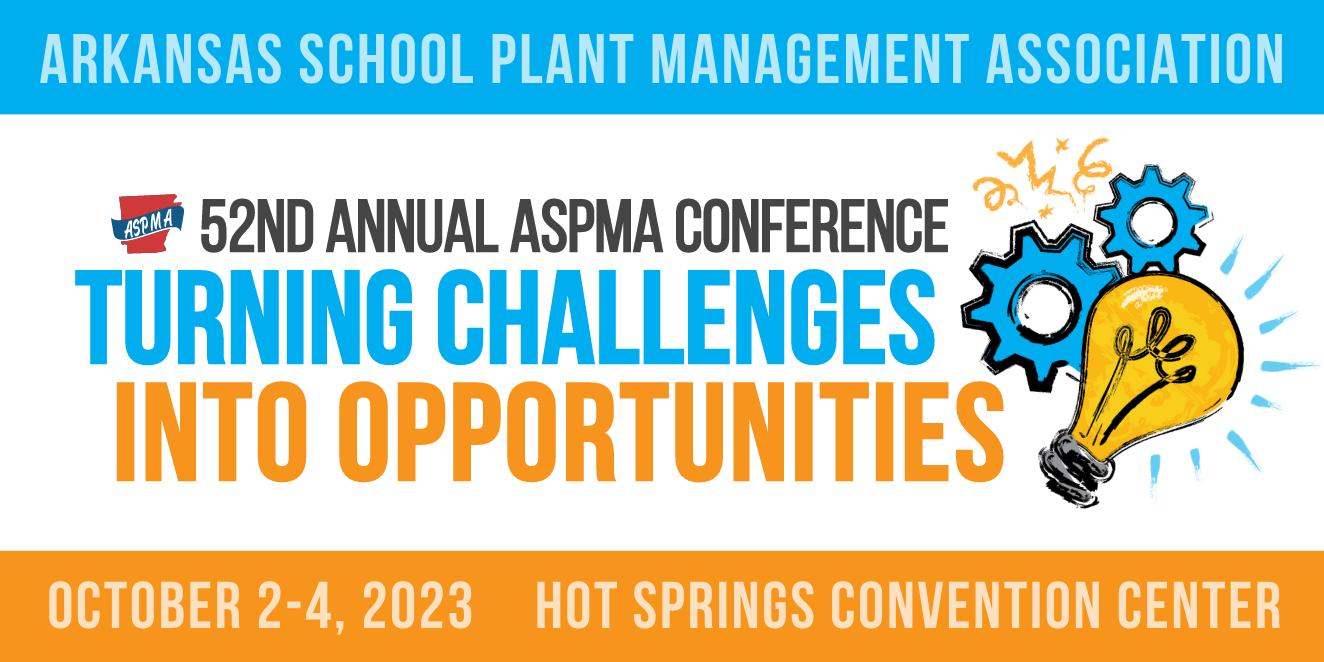
GT Administrators! All Educators!
Registration is now open for the 2023 AAGEA Conference to be held on October 4-5, 2023, at the Benton Event Center.

Registration is now open for the 2023 AAEA Fall Conference to be held on October 10, 2023, at the Benton Event Center.
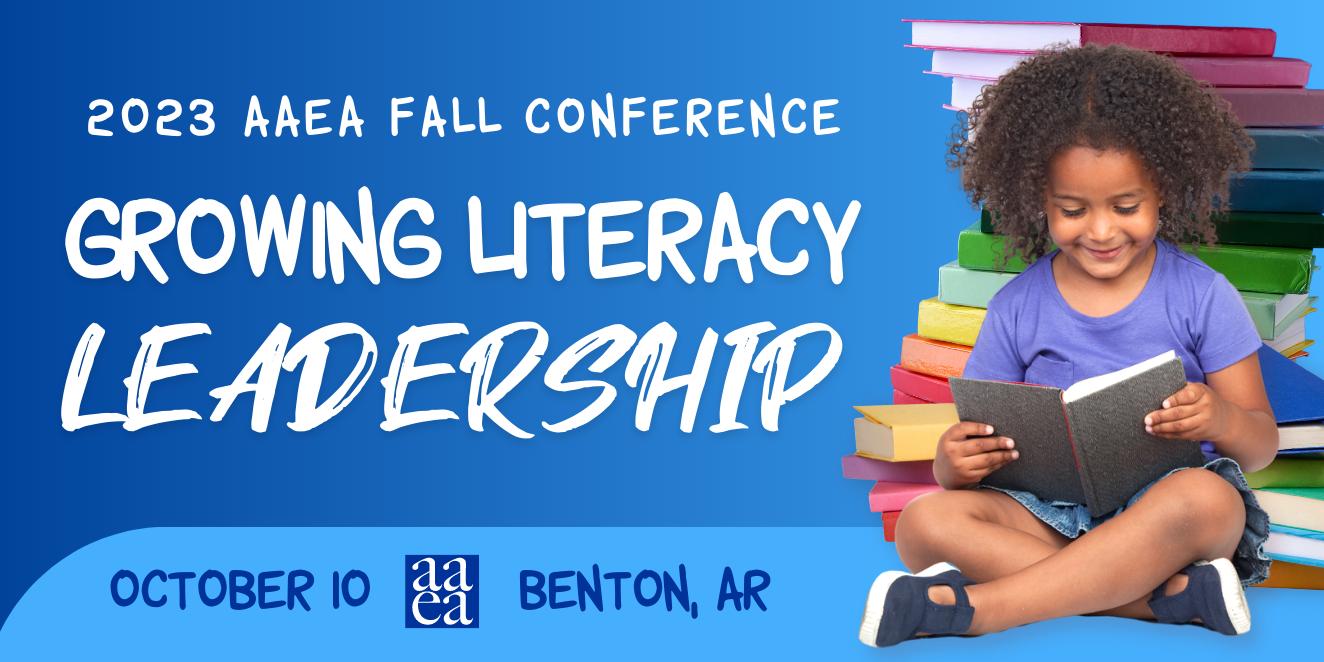
9
UPCOMING EVENTS | SEPT
OCT
/
Administrative Assistant
On a Role! Rachel Blocker
Learn more about AAEA Staff and the roles they serve!
One of our newest staff members is Rachel Blocker, who began working at AAEA in late June of this year as our Administrative Assistant. Rachel fulfills a wide variety of tasks across the office from providing member support to managing invoices. This fall she will also begin working more closely with our exhibitors, collaborating with them during conferences to ensure the smoothest experience for both them and our attendees. She says, "Every day I learn more about AAEA and all that we do to aid the advancement of education in Arkansas."
Rachel graduated from Arkansas State University in May of 2022 with a BA in Communication Studies and minor in History. After graduating, she moved back home to Central Arkansas to be around her family again. While living in Conway, she worked as a sales representative until she found her home here at AAEA.



Rachel says her impact that AAEA makes in Arkansas education. I am proud to be a part of an organization that is dedicated to lifting Arkansas’s educational leaders up, and in turn aiding them in inspiring the next generation of Arkansans."
When not at work, Rachel enjoys spending time with her family, exploring the outdoors, reading, and volunteering with the humane society.

AAEA
Compliance Connection
HSAs and 401(k)s: Why Gen Z and Millennials Need Both
Submitted by Ginger Huff, Arkansas State Manager, American Fidelity Assurance Co.

Saving for retirement is an important part of life. Ideally, you should start saving when you enter the workforce. However, most people don't start that early, requiring them to save greater amounts later, or potentially leaving them with less money for retirement. Among the most common ways to save for retirement are employer-based plans such as a 401(k). A 401(k) allows employees to contribute a percentage of their pay. Sometimes, employers will match up to a certain amount. Gen Z and millennials may assume their 401(k) is enough, but that might not be realistic. Why? Inflation.
As inflation grows, the value of money decreases. In other words, you cannot buy as much with a dollar as you once could. Even if Gen Z and millennials save for retirement with a 401(k), it might not be enough. Inflation could take a "bite" out of their savings, and the amount they saved might not go as far as they expect. Fortunately, there are ways to make a more secure retirement. It's important for these generations to save beyond their employer-sponsored options. There are many tools to add money to retirement savings, while reducing taxes.
Combining retirement funds and lower taxes can make it easier for all generations to save. This is especially important since people are living longer. Another way to invest is by using a Health Savings Account (HSA)
An HSA can be used as a retirement fund to cover medical expenses without dipping into a 401(k). The contributions, earnings and interest are tax-free. When the money is used for eligible expenses, those withdrawals are also not taxable.
HSAs can be invested in stocks, bonds, or other assets, depending on the options available from your HSA administrator. This strategy allows account holders to take advantage of market gains without incurring capital gains taxes. After retirement, an HSA can cover health-related expenses and, at a certain age, withdrawals can be used for non-medical expenses. However, keep in mind that distributions for nonmedical purposes are required to be reported as taxable income.
While HSAs are growing in popularity, they remain an underused tool considering the advantages they offer. As you learn about your available benefits, consider how an HSA could help you prepare for your future.
Assessments—Invaluable Tools in Any Field Over the Top
Submitted by Deveny Coryell, Editor, Coryell Roofing & Construction
“Education is the foundation for success.”
-Governor Sara Sanders Huckabee
The assessment of educational needs is a necessity, and assessment tools, such as standardized testing, are a routine part of the school year as educators strive to improve student learning and outcomes.
In the Spring of 2024, Arkansas will roll out The Arkansas Teaching and Learning Assessment System (ATLAS), a criterion-based test for students grades three through ten. ATLAS is designed to measure students’ abilities against a predetermined standard rather than measuring it against how their peers perform. This assessment tool should more accurately determine the individual student’s abilities and needs and indicate whether each student is performing at grade level as expected.
Assessment tools are invaluable in the roofing industry, also, and need to be a routine part of a
school district’s yearly maintenance plan. Each roof, just like each student, weathers life in an individual way, and professional roofers, like professional educators, have predetermined standards by which to evaluate a roofing system.
Roofs, like students, need periodic assessments to know whether they are performing as they should for their age and environment. Roof assessments by professional roofers educate administrators and enable them to map a strategy for the best possible outcome for each roof and for their school’s budget
Coryell Roofing takes every opportunity to remind administrators to retain a professional roofing team, preferably in the fall and in the spring, to assess the condition of each roof on each building on their campus.
Assessment is part of education. And education is the foundation of success--in all aspects of life.

11
The Cutting Edge
This segment features content from other AAEA publications. The Cutting Edge is a monthly publication available to AACTEA members. The following excerpt comes from the August 2023 issue.

LRSD & UA Little Rock Collaborate on Teacher Residency Model
The Little Rock School District recently decided to move forward with a program designed to train UA Little Rock students to become teachers. Hopefully, this teacher residency program could help address teacher shortages. Five selected students from UA Little Rock will be training an entire year in the district this coming year. The goal is to produce a steady stream of high-quality teachers who are ready for the classroom after the program is finished. While this pilot is starting small this year, the ultimate goal is to expand and have a real pipeline of teachers well prepared for teaching and learning.
Arkansas Military and First Responders Academy (AMFRA) Announces New Partnerships

A recent announcement was made regarding the Academy's new partnerships with several local agencies to enhance educational exposure and develop new internship opportunities for students. New partners will include the Little Rock Police Department, Little Rock Fire Department, Metropolitan Emergency Medical Services, the Arkansas National Guard, Pulaski County Sheriff's Office, Boy Scouts, Girl Scouts, Boys and Girls Club, Arkansas Fire Training Academy, Arkansas State Police, Arkansas Department of Emergency Management and the Forge Institute. AMFRA is a recently opened public charter school that serves students in grades 9-12 in preparation for the military and first responders’ industries.
ATU and Local School Districts - Partners in Education

Arkansas Tech University has recently entered into memorandums of understanding that will create student scholar residency pilot programs with the Russellville School District and Dardanelle School District for the 2023-24 school year.
ATU students who are completing their education degree and licensure requirements will be eligible to apply for a paid year-long residency within a school in one of the partner districts. The goal of this program is to enhance the preparation of teacher candidates as they seek to become full-time classroom instructors ready for teaching and learning. Research indicates that paid year-long residency experiences benefit the resident, students, the supervising teacher and the school by providing real-life classroom experiences.
During the pilot year of 2023-24, there will be three year-long residencies available for ATU students to serve in the Russellville School District and two year-long residencies available for ATU students to serve in the Dardanelle School District. Funding assistance for the program will be provided by a Forward Arkansas grant obtained by ATU.
Interested in more from The Cutting Edge? Contact our office at 501-372-1691.
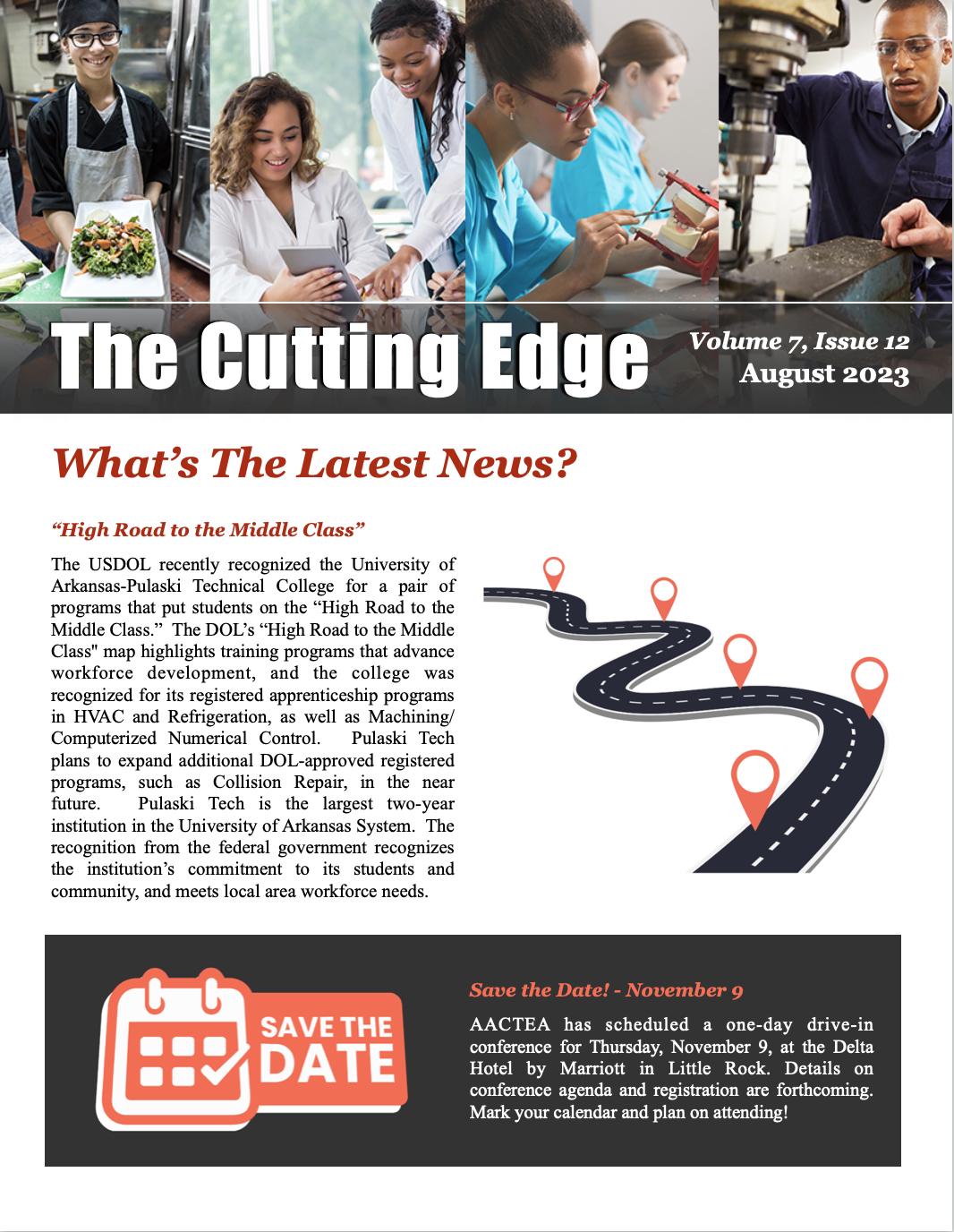
12 Publication Sneak
Peek:
Visit
The AAEA Job Board is a calendar-year subscription that assists districts with the ever-increasing challenge of recruiting quality staff. It is a significant resource for educators, both in-state and outof-state, seeking employment in Arkansas schools.

Over 165 school districts are participating in the program, which has been extremely helpful to schools and educators over the years. The site is used year-round and is accessed extensively during the second semester. It is not unusual to see over 400 jobs posted on the Job Board at one time. With an account, school districts may post unlimited job vacancies throughout the year.
To subscribe (by district) or to post job openings, contact Lana Webb, Administrative Specialist, at l.webb@theaaea.org or at 501-372-1691.
Job Openings
District Name Position
North Little Rock School District Elementary Assistant Principal
North Little Rock School District Secondary Assistant Principal
North Little Rock School District Head School Counselor Center of Excellence
Little Rock School District Assistant Principal - Elementary - Bale
Pulaski County Special School District Lead IT Infrastructure Engineer
Gravette Public Schools Director of Student Services
13
arjobsined.schoolspring.com


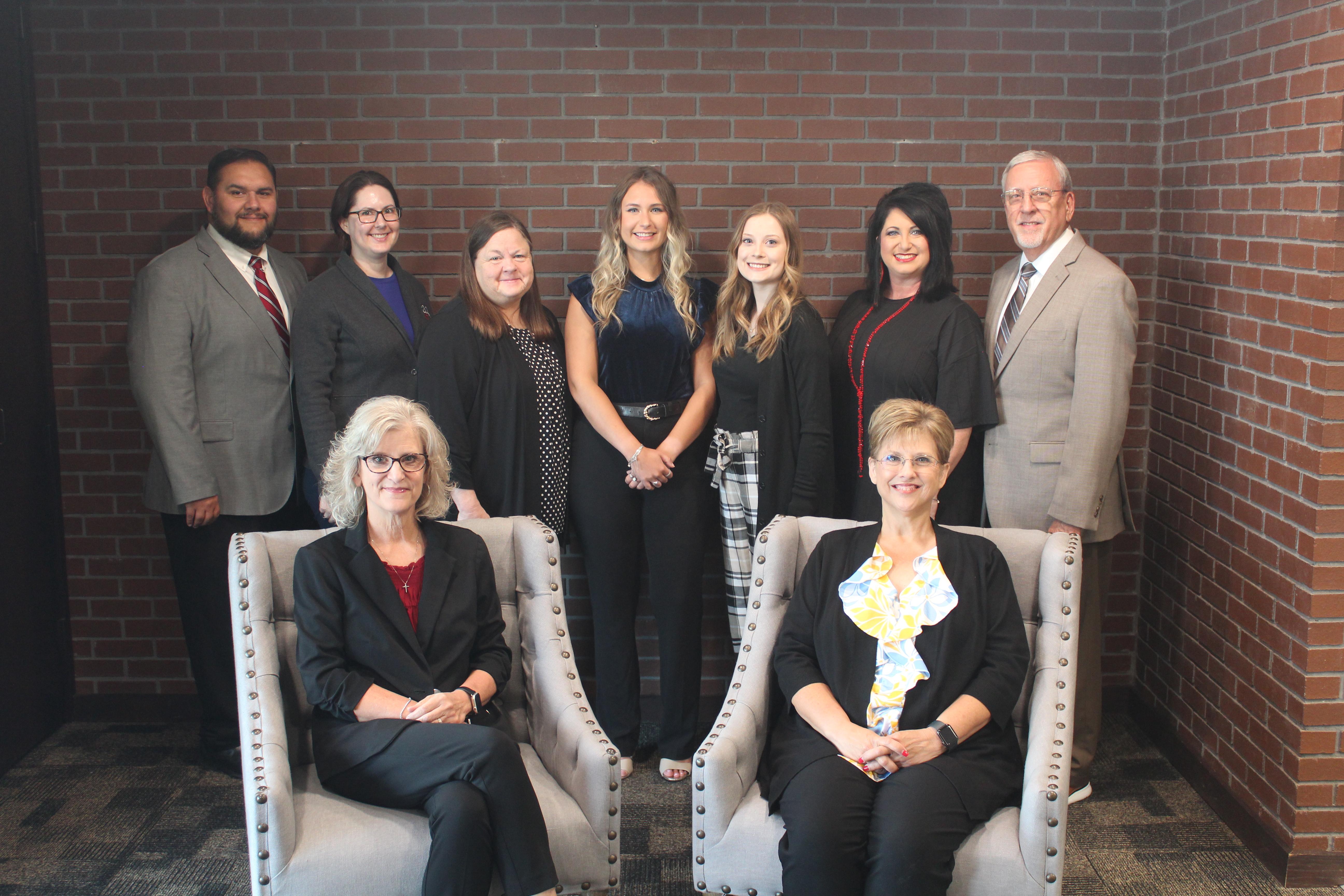
14 Training Net orking Mentoring Legal Ser ices Ad ocacy for School Administrators The o i c e V Training Net orking Mentoring Legal Ser ices Ad ocacy for School Administrators The o i c e V Iiiiiiiiii iiiiiiiiiii Iiiiiiiiii iiiiiiiiiii 219 South Victory, Little Rock, AR 72201 | 501.372.1691 | www.theaaea.org Follow us on social media: The AAEA Team Be a part of something BIGGER than an individual. We are here to assist you!










































